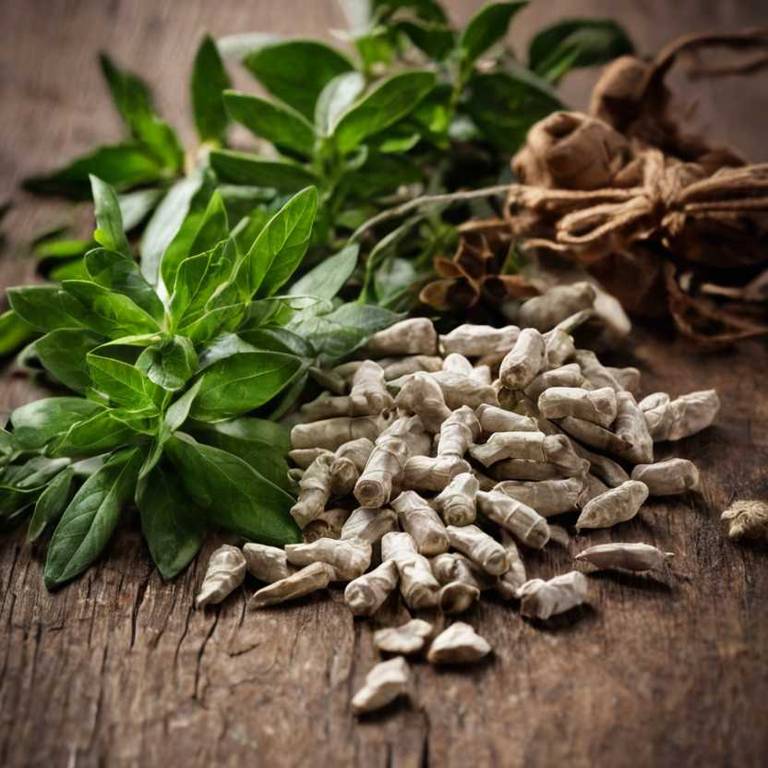Benzoin (Styrax benzoin)
Benzoin (Styrax benzoin) is a member of the Styracaceae family, native to Southeast Asia, Indonesia, and Malay Peninsula. Traditionally, its resin, gum, and balsam have been used for powders, infusions, and poultices.
This herb is particularly valued for its astringent, anti-inflammatory, and tonic actions, and has a long history of use in european herbal medicine, traditional chinese medicine, and japanese kampo medicine.

Quick Facts / Key Information
| Common Name | Benzoin |
|---|---|
| Scientific Name | Styrax benzoin |
| Plant Family | Styracaceae |
| Genus | Styrax |
| Species | benzoin |
| Native Range | Southeast Asia, Indonesia, Malay Peninsula |
| Plant Parts Used | Resin, Gum, Balsam |
| Primary Medicinal Actions | Astringent, Anti-Inflammatory, Tonic |
| Primary Traditional Systems | European Herbal Medicine, Traditional Chinese Medicine, Japanese Kampo Medicine |
| Historical Preparation Methods | Powder, Infusion, Poultice |
Botanical Identity
- Scientific Name
- Styrax benzoin
- Common Name
- Benzoin
- Synonyms / Alternative Names
- Styrax Benzoin, Styrax, Benzoin Gum
- Plant Family
- Styracaceae
- Genus
- Styrax
Botanical Description
- Growth Habit
- Perennial herbaceous plant.
- Height
- It typically reaches a height of 5 to 10 meters.
- Leaves
- Lateral, opposite, ovate leaves with dark green upper surface and lighter green lower surface, featuring prominent stomatal bands along the midrib.
- Flowers
- Inflorescence composed of clustered flowers, each with five white petals and five yellow stamens, actinomorphic symmetry, with a swollen, glandular disk at the base of the ovary.
- Stems
- Woody, erect, unbranched, with smooth, cylindrical surface and longitudinal ridges.
Traditional Uses / Historical Use
Traditional Systems
- European Herbal Medicine
- Traditional Chinese Medicine
- Japanese Kampo Medicine
Historical Preparation Methods
- Powder
- Infusion
- Poultice
- Tincture
Medicinal Actions
- Astringent
- Historically regarded as a soothing astringent, for surface-level applications.
- Anti-inflammatory
- Traditionally described as a gentle anti-inflammatory, in tissue-soothing contexts.
- Tonic
- Commonly referenced as a mild tonic, for broad-use formulations.
- Expectorant
- As described in traditional systems, a moderate expectorant, for airway-related applications.
Active Compounds
- Essential Oil
- A mixture of naturally occurring compounds responsible for plant aroma.
- Tannin
- Plant-derived compounds known for their ability to bind proteins.
- Phenolic Acid
- Naturally occurring phenolic compounds present in many plant species.
- Coumarin
- Plant-derived compounds often associated with fragrance-related chemistry.
Modern Research Overview
This section is reserved for future summaries of scientific research related to this plant. As additional verified sources are reviewed, relevant study information will be added here.
Safety & Contraindications
- General Precautions
- Precautionary considerations have been reported in relation to this herb.
- Contraindications
- Specific contraindications associated with this herb have not been well documented.
- Allergies
- Allergic reactions associated with this herb have not been well documented.
- Drug Interactions
- There is insufficient evidence to determine whether this herb interacts with pharmaceutical drugs.
- Toxicity
- Available information regarding the toxicity of this herb is limited.
- Pregnancy & Breastfeeding
- Safety during pregnancy and breastfeeding has not been well documented.
Preparation & Usage Methods
- Infusion
- Dried or fresh plant parts are infused in hot water and consumed as a beverage.
- Decoction
- A preparation method involving prolonged boiling of roots, bark, or dense plant material.
- Poultice
- A topical preparation made by applying softened plant material externally.
- Extract
- A preparation involving the separation of plant constituents without alcohol.
- Tincture
- Plant material is macerated in alcohol to create a concentrated liquid extract.
Growing, Harvesting & Storage
Growing / Cultivation
- Soil
- Prefers loamy soil with well-drained conditions. Typically grows best in organically rich soils.
- Sunlight
- Thrives in partial shade. Tolerates full sun to partial shade.
- Watering
- Prefers seasonally moist soils. Tolerates periodic dry conditions.
Medical Disclaimer
The information provided on this page is for educational and informational purposes only. It is not intended to diagnose, treat, cure, or prevent any medical condition. Always consult a qualified healthcare professional before using any herb for medicinal purposes.